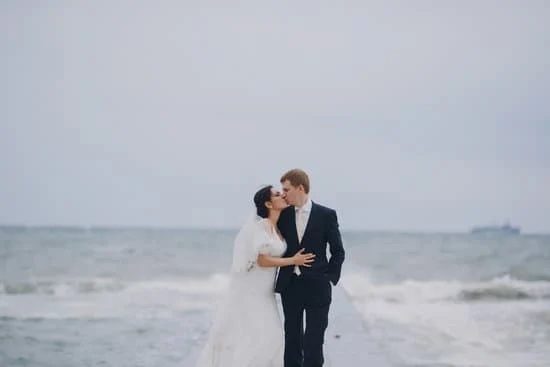Who pays for the wedding? This age-old question has been a topic of discussion and tradition for generations. In this article, we will delve into the historical aspects of wedding expenses, exploring who traditionally foots the bill for the big day and the reasons behind these customs. From ancient practices to more modern trends, understanding the origins of wedding expenses can shed light on the evolving roles and responsibilities.
Throughout history, there have been established traditions regarding who bears the financial burden of a wedding. From the bride’s family to the groom’s family, and even other contributors such as friends or sponsors, each culture and religion have their own set expectations and customs when it comes to funding a wedding. By taking a closer look at these traditions, we can gain insight into why certain parties have historically been expected to contribute financially to this momentous occasion.
As times have changed, so have the dynamics of paying for weddings. Modern trends in wedding expenses show a shift in traditional roles and an increasing trend of couples shouldering their own financial burdens. Understanding these changes and navigating the new landscape of wedding expenses is crucial for couples planning their special day. Join us as we explore not only the historical aspects but also how contemporary practices are reshaping who pays for weddings and why.
Modern Trends in Wedding Expenses
In today’s modern society, the traditional roles and responsibilities for paying for weddings have significantly shifted. Couples are no longer solely relying on their families to cover the costs of their special day. Instead, there is a growing trend of couples taking on a more active role in financing their own weddings.
Changing Financial Dynamics
With changing social and economic dynamics, many millennials are waiting longer to get married, which allows them more time to establish themselves in their careers and become financially stable. As a result, they are often more capable of contributing financially to their wedding expenses. Additionally, as more couples are getting married at an older age, they typically have more savings and resources to allocate towards their wedding.
Couples Taking Control
The shift in gender roles and the rise of gender equality has also played a significant role in changing how weddings are financed. Rather than following traditional norms where the bride’s family covers most of the costs, modern couples are taking control of their wedding finances. This allows them greater independence and flexibility in planning the wedding of their dreams without feeling beholden to others.
Financial Considerations
As couples take on a larger financial responsibility for their weddings, it is important for them to carefully consider their budgetary constraints. Planning a wedding can be costly, so it’s essential for couples to establish a realistic budget and prioritize their expenses accordingly. It’s also crucial for them to have open and transparent communication about finances with both sets of parents or any other potential contributors who may want to provide financial support.
The Bride’s Family
Historically, the bride’s family has been expected to shoulder a significant portion of the wedding expenses. This tradition dates back to dowries in some cultures, as well as the concept that the bride’s family is providing a gift to the groom’s family. These financial contributions were seen as a way for the bride’s family to demonstrate their ability to support their daughter and her new husband.
In modern times, however, there has been a shift in these expectations. While some brides’ families still adhere to traditional customs and cover certain expenses such as the venue, catering, or flowers, many couples are now taking on more of the financial burden themselves.
In fact, according to recent surveys, nearly 70% of couples contribute financially to their own weddings. This trend might be due to changing social norms and economic factors that have led couples to fund their own celebrations.
Despite these changes, there are still some traditional expectations placed on the bride’s family when it comes to wedding expenses. For example, in some cultures, it is still customary for the bride’s family to pay for the wedding dress and associated accessories.
Additionally, they may also be responsible for covering costs related to invitations and other stationery items. Nonetheless, it is crucial for couples and their families to openly communicate about who will pay for what aspects of the wedding in order to manage expectations and avoid any misunderstandings.
| Wedding Expense | Traditionally Paid by Bride’s Family |
|---|---|
| Wedding Dress | Yes |
| Venue | Sometimes |
| Catering | Sometimes |
The Groom’s Family
In traditional wedding etiquette, it has been customary for the bride’s family to bear the majority of the wedding expenses. However, in modern times, there has been a shift towards a more egalitarian approach to wedding costs. That being said, it is still common for the groom’s family to play a role in contributing financially to the wedding.
The groom’s family traditionally takes on specific financial responsibilities such as paying for the rehearsal dinner, purchasing the marriage license, and providing accommodations for out-of-town guests. These expenses are seen as part of their contribution to the wedding celebrations and are considered customary in many cultures and regions.
It is important for couples and their families to have open and honest conversations about who will pay for what when it comes to wedding expenses. This transparency can help avoid misunderstandings or tensions down the line. Ultimately, whether it is the bride’s family, groom’s family, or the couple themselves who pay for the wedding, what matters most is that everyone involved feels comfortable with their financial contributions and that decisions are made with mutual respect and understanding.
| Groom’s Family Responsibilities | Financial Contributions |
|---|---|
| Rehearsal Dinner | Customary financial involvement |
| Marriage License | Expected contribution |
| Accommodations for out-of-town guests | Cultural norms vary in expectations |
The Couple
In modern times, there has been a noticeable shift in the responsibility of paying for weddings, with an increasing number of couples opting to shoulder the financial burden themselves. This trend reflects a greater emphasis on independence and autonomy, as well as a desire for the wedding to truly represent the couple’s values and preferences.
Couples who pay for their own wedding often have more control over the decision-making process, allowing them to personalize every aspect of their special day without being beholden to traditional expectations or familial obligations. However, this shift also brings about certain financial considerations that must be carefully managed in order to prevent overspending and unnecessary stress.
When it comes to financing their own wedding, couples are encouraged to create a realistic budget that aligns with their financial capacity. Prioritizing essential expenses such as venue, catering, and photography will help ensure that they stay within budget while still achieving their desired aesthetic and ambiance. It is also crucial for couples to communicate openly about their financial situation and set clear expectations with each other regarding their individual contributions to the wedding fund.
Ultimately, couples who pay for their own wedding may find it empowering and rewarding to take ownership of this significant milestone in their lives. By approaching the financial aspects of wedding planning with pragmatism and cooperation, they can navigate the process successfully while creating lasting memories without unnecessary debt or strain on their relationship.
- Consider creating a separate savings account specifically designated for wedding expenses
- Research cost-effective alternatives for traditional wedding elements such as DIY decorations or opting for non-traditional venues
- Consult with a financial advisor if necessary to gain insight into how best to manage your personal finances during this time
Other Contributors
In addition to the bride’s and groom’s families, there are often other contributors who play a role in financing a wedding. These can include extended family members, close friends, or even sponsors who may offer financial support. In some cases, these additional contributors can alleviate some of the financial burden on the couple or their families.
Extended Family Members
Extended family members such as grandparents, aunts, uncles, and cousins may also want to contribute financially to the wedding. This can be a way for them to show their love and support for the couple as they start their new life together. Their contributions can help to cover specific costs such as the rehearsal dinner, transportation, or even the honeymoon.
Close Friends
Close friends of the couple may also offer financial assistance for the wedding. This could come in the form of helping out with specific expenses such as bridal party attire, decorations, or entertainment. Friends who have a particular skill set, such as photography or graphic design, may also volunteer their services as a contribution to the wedding.
Sponsors
Some couples may seek out sponsors for their wedding, particularly if they are planning a large or elaborate celebration. Sponsors can come in various forms including local businesses that offer products or services related to weddings (such as catering companies or florists), or even family friends who work in industries that could provide assistance at reduced rates.
While seeking out sponsors requires careful negotiation and consideration of expectations, it can be an effective way to offset some of the costs associated with hosting a wedding.
These additional contributors serve an important role in helping make it possible for couples to celebrate their special day without shouldering all of the financial responsibility themselves. It’s important for couples to communicate openly and honestly with these potential contributors about their expectations and any specific ways they would like to lend support towards making their dream wedding a reality.
Cultural and Religious Perspectives
When it comes to wedding expenses, cultural and religious perspectives play a significant role in dictating who pays for the wedding and the significance behind it. Different cultures and religions have unique traditions and expectations when it comes to financing a wedding. Let’s take a closer look at how various cultural and religious beliefs influence the financial responsibilities of a wedding:
- In some cultures, the bride’s family is traditionally expected to cover the majority of the wedding expenses. This stems from the notion that a daughter’s marriage is her family’s responsibility, and they are expected to host a grand celebration to honor her union.
- On the other hand, in certain cultures, the groom’s family bears the financial burden of the wedding. This can be attributed to the belief that it is their duty to provide for their son’s marriage and ensure that he starts his new life on solid footing.
- There are also cultures where both families come together to share the costs of the wedding equally. This demonstrates unity and collaboration between both sides, symbolizing the merging of two families.
Religious perspectives also influence who pays for weddings and why. For example, in some faiths, there are specific customs or rituals associated with weddings that impact financial contributions. Understanding these cultural and religious perspectives can help couples navigate their wedding planning process while respecting traditional expectations.
Ultimately, regardless of cultural or religious background, it is essential for couples to have open and respectful communication with all parties involved in order to determine who will pay for what aspects of their special day. By acknowledging and understanding these perspectives, couples can plan their weddings in a way that honors tradition while also aligning with their own values and beliefs.
Budgeting and Financial Planning
In conclusion, the question of who pays for the wedding is a complex and multifaceted issue that is deeply rooted in tradition, culture, and personal financial circumstances. While there are historical and traditional expectations regarding the financial responsibilities of the bride’s family, groom’s family, and the couple themselves, modern trends have seen a shift in these roles.
Today, many couples are taking on the responsibility of funding their own weddings, often with contributions from both families and other sources.
For couples navigating the financial aspects of their wedding, it is important to approach budgeting and financial planning with careful consideration. Setting a realistic budget based on available resources is crucial, as overspending can lead to unnecessary stress and financial strain. Communicating openly with all parties involved about financial contributions and expectations is also essential for avoiding misunderstandings or conflicts later on. Additionally, seeking practical advice from professionals or experienced individuals can provide valuable insight into managing wedding expenses effectively.
Ultimately, regardless of who pays for the wedding, the most important thing is for couples to focus on celebrating their love and commitment to each other. By approaching wedding expenses thoughtfully and responsibly, couples can ensure that their special day is memorable without causing undue financial burden to themselves or those involved in contributing towards it.
Frequently Asked Questions
What Is the Groom’s Family Supposed to Pay For?
The groom’s family is traditionally expected to pay for certain expenses related to the wedding, such as the rehearsal dinner, the officiant’s fee, the marriage license, and sometimes the honeymoon. These financial responsibilities may vary based on cultural or regional customs.
Do the Bride’s Parents Still Pay for the Wedding?
While it used to be customary for the bride’s parents to cover a significant portion of the wedding costs, modern practices have become more flexible. In some cases, the bride’s parents still contribute financially, but many couples now share or cover the expenses themselves.
Who Pays for the Actual Wedding?
The actual wedding expenses are typically shared between both families and the couple. This can include costs like the ceremony and reception venue, catering, flowers, photography, attire, entertainment, and other essential elements of a wedding celebration. Some couples also choose to save up and pay for their own weddings independently.

Welcome to my blog about home and family. This blog is a place where I will share my thoughts, ideas, and experiences related to these important topics. I am a stay-at-home mom with two young children. I hope you enjoy reading it! and may find some helpful tips and ideas that will make your home and family life even better!





